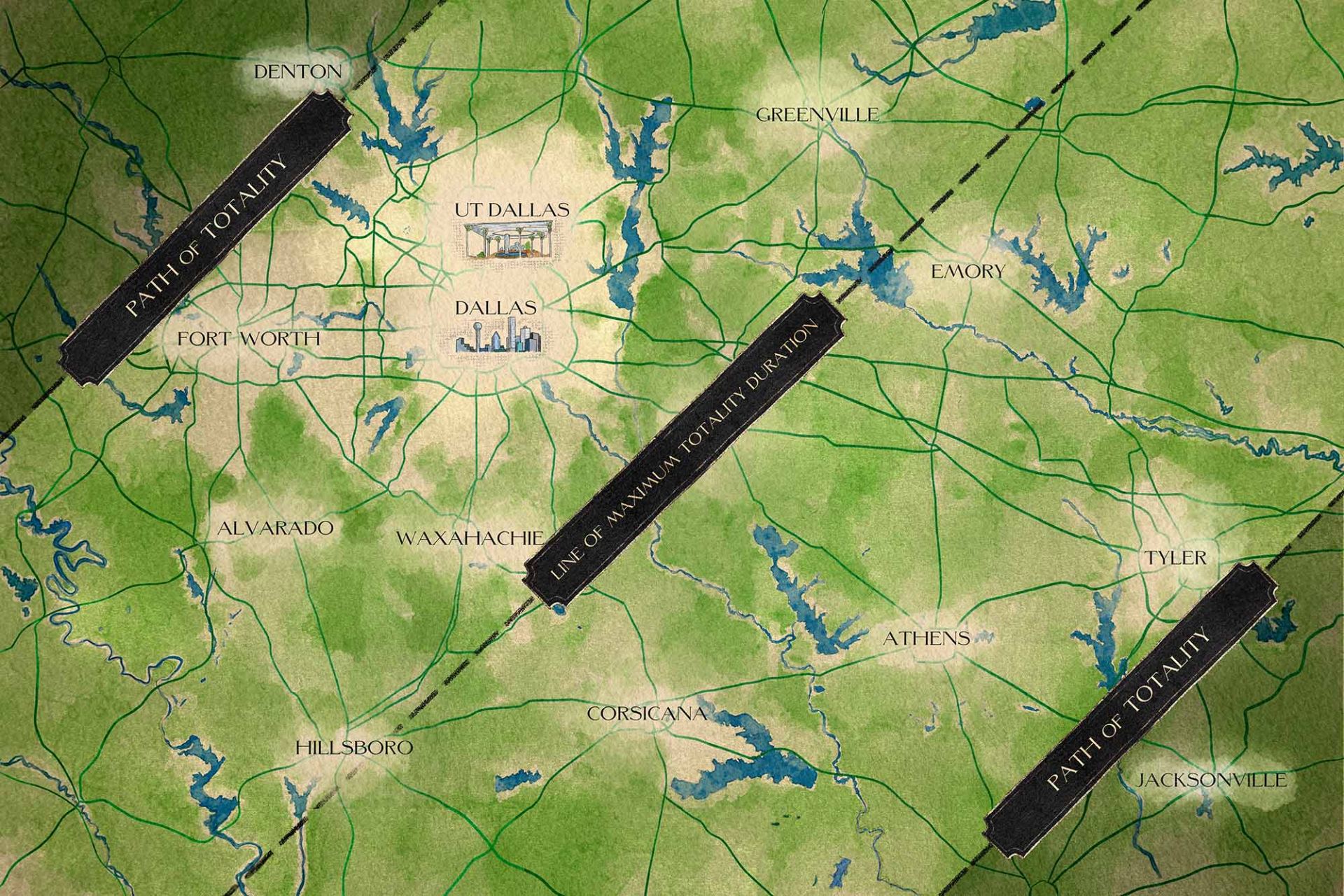
The University of Texas at Dallas community will celebrate a celestial event almost 150 years in the making for North Texas with activities designed to bring Comets closer together and give them a better view of the science in the skies.
“No Comet Left Inside,” UTD’s campuswide celebration, will include giveaways, booths, music and telescopic projection viewing areas. The most recent total solar eclipse visible in North Texas was in 1878, and after this year’s eclipse, another one won’t be observable in the region until 2317.
Classes on April 8 are canceled between 1 p.m. and 2 p.m., and nonessential services will be suspended so that staff members, as well as faculty members and students, can enjoy the spectacle.
“For many viewers, this total solar eclipse will be a once-in-a-lifetime event,” said , planetary scientist and associate professor and department head of in the . Urquhart, who viewed the 2017 total solar eclipse from Tennessee, leads a campuswide eclipse committee.
Staying Safe
Protective eclipse glasses must be worn to view the sun safely during the partial phases of the eclipse leading up to and directly after totality. Only during totality is it safe to remove the glasses and view the eclipse directly. The website has an interactive map that provides details about the timing of various phases of the eclipse from a specific location.
“Witnessing a total solar eclipse can be a profound, transformative experience for many people, and experiencing it together with friends and family, or even strangers, can make lasting memories. This is an event for all Comets. If you have a clear view of the sun, you don’t have to go anywhere else to be a part of this rare celestial event.”
Campus activities will include:
- 10 a.m.: Protective eclipse glasses, distributed by the , and commemorative T-shirts will be available, while supplies last, to those who show their valid Comet Card. After the eclipse, used glasses may be deposited in donation bins for . See the for locations.
- 11 a.m. to noon: A roundtable discussion featuring Dr. Eileen Stansbery, chief of the Astromaterials Research and Exploration Science Division at the NASA Johnson Space Center; Dan Brounoff, chief meteorologist at KRLD-AM; and , UTD professor of , will be held in the .
- Noon: Various organizations will have booths on , and music will be played on and near the . KRLD’s Brounoff will broadcast live from Chess Plaza.
- UTD scientists will set up with telescopes for projection viewing, as well as other indirect viewing methods.
- Livestreaming of the eclipse will be available in the .
, professor of and of the of science in the , teaches courses on the history of astronomy and cosmology, which include perspectives on the scientific, historical, cultural and artistic significance of astronomical events. She witnessed the 2017 eclipse from Nebraska.
For the latest eclipse news, events and information, along with safe-viewing tips and other resources, visit the .
“Over the past four years, especially with the COVID-19 pandemic, many people have felt isolated and alone in their urban lives,” Gossin said. “Surrounded by high-rises and parking lots, we can feel like we’re disconnected from the natural world. But with this total solar eclipse, nature and the cosmos are literally coming straight into our backyards.”
Tidbits
Mukund Murari Goli, a junior in the , won the solar eclipse T-shirt student design contest.
, associate professor of and Fellow, Eugene McDermott Distinguished Professor, and his students have built and deployed sensors on campus that will monitor real-time changes in the concentration of electrons in a region of Earth’s upper atmosphere, called the ionosphere, during the eclipse. Disturbances in the ionosphere affect the propagation of radio signals transmitted by GPS satellites.
UT Dallas is collecting used eclipse glasses from the campus event and a viewing event at Cotton Bowl Stadium at Fair Park in Dallas to donate to Astronomers Without Borders’ . UTD volunteers will vet the glasses for reusability by the international group, which distributes donated glasses worldwide in support of astronomy outreach and education.
